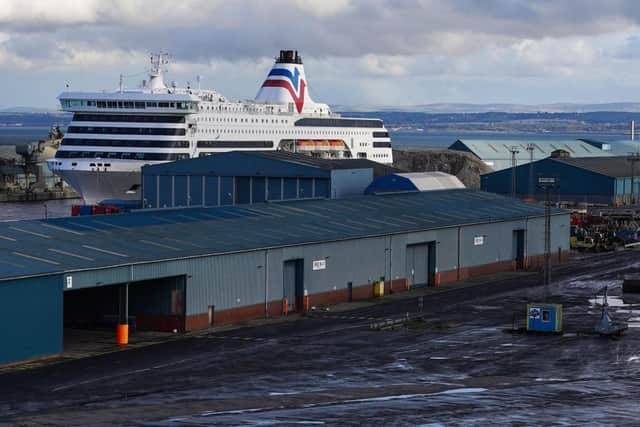War in Ukraine: Super sponsor scheme for Ukrainian refugees will not be re-started, Scottish Government confirms
As revealed in Scotland on Sunday, a review of the Government’s procedures to deal with those who have fled the war in Ukraine to come to Scotland has laid out seven criteria that need to be met before the scheme can be relaunched, following a planned three-month pause that started in July.
Refugees minister Neil Gray told MSPs that at the present time, it is not possible to re-start the scheme, based on a failure to meet the necessary criteria.
Advertisement
Hide AdAdvertisement
Hide AdThe review also set out steps the Government will take to increase the provision of longer-term homes for Ukrainians, including a campaign to recruit new hosts to take in new arrivals.


However, Mr Gray said the Government would also look to cut costs by slashing “the provision of hospitality” in temporary accommodation such as hotels or cruise ships, with some longer-term refugees in employment or receipt of benefits expected to contribute to the cost of offerings such as meals.
He said tests would be “reviewed on a constant basis”, with a view to reopening the scheme. But Mr Gray said issues including an accommodation shortage in Scotland and the situation on the ground in Ukraine were “going to compete”.
"We have developed seven criteria we will use to objectively measure whether or not the scheme can reopen,” Mr Gray said. “Reopening must be predicated on our commitment to displaced people already in Scotland and those yet to travel.
"We must be assured that measures are in place to mitigate pressures on local councils and other services who have been working tirelessly and that funding is in place to meet associated costs. Having considered the current position, I've concluded we are unable to resume applications to the super sponsor scheme at this time.”
The scheme, which allowed Ukrainians to name the Government as their sponsor for a UK Government Homes for Ukraine visa, rather than find an individual host, was paused, supposedly for three months, on July 13. The pause was to allow the Government to catch up with a backlog of new arrivals and match them to long-term accommodation, with the three month deadline having now passed.
The review also looks at ways of creating longer-term accommodation, including building “modular housing” and bringing forward a range of interventions such as one-off grants and deposit guarantees. It said it would also continue to prioritise investment in social housing and work with local authorities and registered social landlords to make best possible use of the dedicated £50 million ‘Ukraine Longer Term Resettlement Fund’.
The campaign to recruit people willing to open their homes to refugees will be launched in coming weeks, as well as a “Warm Scottish Gathering” where Ukrainians and local communities can come together in a range of cultural events across Scotland.
Advertisement
Hide AdAdvertisement
Hide AdMr Gray said: “There will also be many who are interested in hosting, but have not yet taken the first step as they're not sure what's expected of them. Therefore we will launch a Scotland-specific campaign asking households across the nation to consider offering a place in their home to a Ukrainian.”
The latest figures published by the Scottish Government show 30,629 visas have been granted under the super sponsor scheme, with 17,463 arrivals to date. However, just 2,790 super sponsor visa holders have been matched into longer-term accommodation. There are around 7,000 people in Scottish Government hotels and passenger ships.
The review, published by Mr Gray, acknowledged more than 13,000 Ukrainians hold Homes for Ukraine visas, with the Government as a named sponsor, but have not yet arrived.
The document said: “It is very difficult to predict with certainty how many of the remaining 13,166 visa holders may decide to travel, and if so when they may arrive. Developments in the war will have a significant bearing on actual behaviour. What is clear, however, is that arrival rates have remained high and visa-holders continue to arrive.”
The review laid out seven criteria for the super sponsor scheme to be re-opened. It requires that:
• Displaced people already in Scotland are in safe and suitable accommodation;
• Welcome accommodation is available for people who are yet to travel, with a pipeline of longer-term properties available;
• Displaced people can access information and advice about relevant services and support;
Advertisement
Hide AdAdvertisement
Hide Ad• Measures are in place to mitigate pressures on local councils and services;
• Clear understanding of the costs related to re-opening the scheme and confirmation funding is place to cover these;
• Clear understanding of the challenges of re-opening the scheme, and how these will be managed;
• Assessment of the situation in Ukraine, including unexpected or unforeseen developments in the war leading to mass migration events.
The review said Ukrainian refugees were likely to continue to need shelter in Scotland for the “medium and longer term”.
It said: “What has become clear in the past weeks and months is that, due to the ongoing war in Ukraine, these displaced communities will very likely need to stay in Scotland into the medium and longer term. We know many Ukrainians ideally hoped their stay would be temporary.
“We have remained clear they are welcome and that Scotland is their home as long as they need it to be. Moving from mass evacuation and into longer-term integration, a mixture of accommodation is required to meet the needs of arrivals and the differing composition of groups – from families to individuals.”
Comments
Want to join the conversation? Please or to comment on this article.